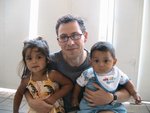Last week, I mentioned the two-part PBS television series on Guatemala, which focused on brutality against women and maternal health and family planning. The segments were hosted on March 7 and 8 by Ray Suarez, reporting from Guatemala, and funded in part by the Bill and Melinda Gates Foundation.
The PBS blog contains several interviews by Suarez that were not included on-air. One was with Guatemala’s Catholic Archbishop Oscar Julio Vian Morales of Guatemala. The Catholic Church, along with Protestant churches, commands a position of influence and authority for many Guatemalans. I was pleased to read that the Archbishop acknowledges a need for family planning, including “all the methods that within the family they decide is best for them.” The Archbishop also promotes the use of condoms to stop the spread of disease. This is news not often reported. Here is the exchange between Suarez and the Archbishop:
RAY SUAREZ: When American officials look at Guatemala they see a country with the fastest growth rate in population in the entire hemisphere, and they see women who wouldn’t necessarily want to avoid having children but would like to space them better. Is there in the family context an acceptable reason for using birth control?
JULIO VIAN MORALES: Our governments as well as other international institutions attack birth directly, but they never attack, or help us to educate people in a way which people start becoming conscious of how many children they should have, because the church is not opposed to family planning. It must exist and it must be compulsory in all facilities.
The problem is how or the methods that are used in this planning, like forcing families and many times sterilizing them for life. In regard to this matter I think we should insist and the foreign governments should insist not that much on family planning to have less children, but in that conscious planning in each family in a responsible manner.
Therefore, they should insist more on education, health, work that our families need so much in our Guatemala.
RAY SUAREZ: You say that the Church is not opposed to family planning. What methods would be ok, what methods would be approved and which are not?
JULIO VIAN MORALES: The method we approve is the one we all know as the Billings method, and all those methods that within the family they decide is best for them. For example, the condom, many times it is an obligation for people to use it. And it is an obligation for people who have AIDS or any other disease.
In that case, it is not that this is a sin, but it is a sin not to do it, because other people are being harmed. In all this methods what must always be present is respect for the human being, for it not to be harmed. We do not accept any methods which may harm the human being.
In another part of the interview, the Archbishop recognizes that any conversation about family planning or violence against Guatemala’s women must begin with Guatemala’s men. Without a change in attitude among men, no real and lasting change can begin to occur.
RAY SUAREZ: I ask about the Catholic church because there is also a great problem that is violence against women and girls, and in fighting them, can the Catholic church tell men, order them: stop beating their wives, their mothers their sisters the women of this country?
JULIO VIAN MORALES: Yes, constantly, be it through the sermon or preparations| that we have in the parishes, we are insisting on this issue. Even more, in each church we have the so calledPastoral de la Mujer [Women’s Pastoral] to help them on this matter.
In fact they are becoming more conscious of their own rights, by attending these groups that have been created. Now, not only do we help change the heart but the mind of us men who, many times don’t know how to treat women, because of that culture, in other countries they would call “machista” , and that certainly also exists here in our country.
A man is the first who has to attend this Pastoral de la Mujer, to know how to treat her and give her the place she really deserves.
As the PBS series illustrates, to live free from brutality and to control reproduction are two rights not possessed by all women in Guatemala. May this unfortunate reality change soon.



 ShareThis
ShareThis


